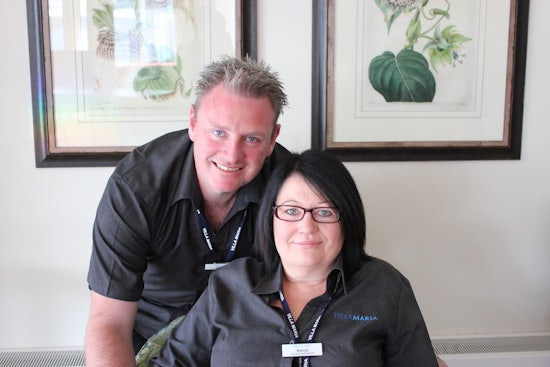Nursing is a family affair
When Andrew and Kerryn Fowler sit around the dinner table most nights they don’t talk about how their day was at work. These days, the conversation is more likely to be about what they learnt in class and preparing for exams.

Husband and wife, Andrew and Kerryn Fowler, have jumped into a mid-life career change and are studying their Diploma of Nursing together through Victorian aged and disability provider, Villa Maria.
The husband and wife team have jumped into a mid-life career change and are studying their Diploma of Nursing together through Villa Maria.
They are among the 120 nurses and student nurses working at Victorian not for profit aged and disability care provider, Villa Maria.
Mr Fowler, 43, and Mrs Fowler, 53, who are personal care assistants at the Wantirna aged care residence three times a week, say nursing is a far cry from their previous professional lives, but they believe they have found their callings.
Until three years ago, the couple ran their own electronics manufacturing business, but got out when the global financial crisis hit.
Mrs Fowler did a PCA spell out course and when Mr Fowler saw how much she enjoyed it, decided to give it a try too.
At the end of the course they were recruited by Villa Maria to work in the new Wantirna aged care residence and received a traineeship to undertake the study to become Division II nurses.
“Nursing just brings you up that step more, it gives you a lot more opportunity, including where you can work,” Mrs Fowler said.
“I love dealing with the people. Once I finish studying I'll probably stay in aged care. I just like that feeling that you're helping someone. It's very rewarding,” she said.
Mr Fowler says he's working in the memory support area at Wantirna and has found it fascinating. In fact, he's now considering a career in mental health.
“Whether it's the dementia area in a nursing home or mental health in a hospital, I really like that area,” Mr Fowler said.
“Every day is different and I love the people; it's very rewarding.”
The couple do everything together – including work shifts and study. And because their housemate is studying for her Division I in nursing, dinner table conversation quickly turns to study.
“If we have an exam together we study together, but if it's an essay we're doing then we work alone,” Mrs Fowler said.
“The other week, our housemate had a friend over for dinner and we sat at the table running through our exam.
“It's motivating to do it together. I think I'd be unmotivated if I was doing it by myself.”
The Fowlers will finish their course, through Skills Training Australia in Knox, in December.











![The new Aged Care Act exposure draft is slated for release in December of 2023, but advocates hope to see it rolled out on January 1, 2024. [Source: Shutterstock]](https://agedcareguide-assets.imgix.net/news/articles/wp/agedcareact__0811.jpg?fm=pjpg&w=520&format=auto&q=65)












Comments